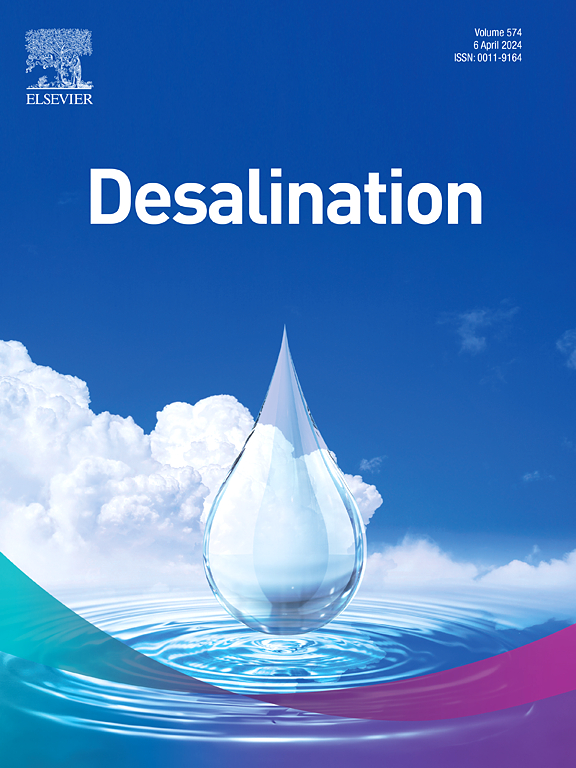用于海水淡化的共价有机框架膜的研究进展:机理、合成策略、应用及未来展望
IF 9.8
1区 工程技术
Q1 ENGINEERING, CHEMICAL
引用次数: 0
摘要
基于膜的海水淡化已经成为一项关键技术,利用膜系统的效率和可扩展性来解决全球水资源短缺问题。共价有机框架(COFs)具有精确设计的纳米孔和可定制的化学功能,在推进下一代海水淡化膜方面显示出巨大的潜力。本文首先探讨了基于cof的海水淡化的基本分离机制,包括粒径排斥、表面润湿性调节和静电相互作用。然后重点介绍了碳纤维膜的设计和合成方面的最新进展,重点介绍了结构控制和界面工程方面的创新。COF膜在海水淡化中的应用根据驱动力进行了分类:压力驱动海水淡化、热驱动蒸馏、蒸汽压力驱动过程和电驱动分离。展望未来,确定了关键的研究领域,包括机器学习引导的孔隙优化,多功能COF混合架构,以及从实验室突破到现实世界实施的大规模性能验证。通过综合这些见解,本综述旨在促进跨学科合作,以释放COFs在创造节能、耐用和可持续的海水淡化技术方面的全部潜力。本文章由计算机程序翻译,如有差异,请以英文原文为准。

Progress in covalent organic framework membranes for water desalination: Mechanistic insights, synthesis strategies, applications, and future prospects
Membrane-based desalination has become a crucial technology, harnessing the efficiency and scalability of membrane systems to address global water scarcity. Covalent organic frameworks (COFs), with their precisely engineered nanopores and customizable chemical functionalities, show great potential for advancing next-generation desalination membranes. This review begins by exploring the fundamental separation mechanisms in COF-based desalination, including size exclusion, surface wettability modulation, and electrostatic interactions. It then highlights recent advances in the design and synthesis of COF membranes, with a focus on innovations in structural control and interfacial engineering. The application of COF membranes in desalination is categorized based on driving forces: pressure-driven desalination, thermally driven distillation, vapor pressure-driven processes, and electrically driven separation. Looking to the future, key research areas are identified, including machine learning-guided pore optimization, multifunctional COF hybrid architectures, and large-scale performance validation to move from laboratory breakthroughs to real-world implementation. By synthesizing these insights, this review aims to promote interdisciplinary collaboration that can unlock the full potential of COFs in creating energy-efficient, durable, and sustainable desalination technologies.
求助全文
通过发布文献求助,成功后即可免费获取论文全文。
去求助
来源期刊

Desalination
工程技术-工程:化工
CiteScore
14.60
自引率
20.20%
发文量
619
审稿时长
41 days
期刊介绍:
Desalination is a scholarly journal that focuses on the field of desalination materials, processes, and associated technologies. It encompasses a wide range of disciplines and aims to publish exceptional papers in this area.
The journal invites submissions that explicitly revolve around water desalting and its applications to various sources such as seawater, groundwater, and wastewater. It particularly encourages research on diverse desalination methods including thermal, membrane, sorption, and hybrid processes.
By providing a platform for innovative studies, Desalination aims to advance the understanding and development of desalination technologies, promoting sustainable solutions for water scarcity challenges.
 求助内容:
求助内容: 应助结果提醒方式:
应助结果提醒方式:


